#ban bullfighting
Explore tagged Tumblr posts
Text
Bullfighting is still legal in many areas of Mexico, in France, Portugal, Colombia, Venezuela, Peru, Ecuador and some cities in Spain.
- BBC.
Image with kind permission from Vegan for the Animals.
@vegan.f.t.a

18 notes
·
View notes
Text







Ferdinand (2017)
#Ferdinand (2017)#animated film#love#friendship#flowers#bulls#horses#bullfighting#ban bullfighting#matador#nonviolence#Spain#goat
10 notes
·
View notes
Text
man. one day i'd love to write a thesis on how benfica was not, contrary to popular belief, a "estado novo club" (quite the opposite actually)
#benfica literally started as a working-class club by poor and working class people#the club founder had to ask for several loans so he could even pay for it#but people associate benfica with estado novo because of how eusébio was used by salazar to hide how racist his government was#“see guys? how can we be racist when our best player is black? ;) ignore what's happening in guiné”#but ironically salazar hated football#he also used ricardo chibanga - famous bullfighter - as a propaganda tool for the regime the exact same way#same as amália rodrigues for how women were treated under his government#they couldn't actually leave the country without his permission#IF ANYTHING it's porto that should be considered the regime's club because they actually hosted matches dedicated to salazar. but alas..#fun fact: when wwii ended because of how anti-soviet the regime was people used benfica flags in the street to celebrate#instead of the soviet flag which was banned
9 notes
·
View notes
Text
i think it's so unfair that people associate the bull with spain because of bullfighting when it's been a symbol of community and religion and other cool stuff here since at least prerroman times.
#i love that our national animal is the bull but i hate why it is our national animal you know#like right now i'm researching about religion in prerroman iberia#and the bull appears all over the place in statues and iconography and such#also you know. gerion's cattle. the bull's skin#all of that is also pretty cool#the bull has always been associated with iberia. it just sucks that it's their deaths what's the most celebrated thing about them#anyways. ban bullfighting !!!
12 notes
·
View notes
Text
10 random facts about Spain you might wanna know for your fan work
My Hetalia hyperfixation came back this 2025 and it's stronger than ever. So to celebrate, I decided to make this post to share with you a little bit of real contemporary Spanish culture and to debunk some stereotypes. If you're writing or creating art about Spain this might help you add some details that will make the character, as well as his relationships with other nations, feel more authentic.

#1. We have two surnames, not a compound one (so it's "Fernández Carriedo", not "Fernandez-Carriedo"). I explained how that works in a post some years ago.
#2. We don't really drink sangría when we go to bars. It's considered a thing for tourists, especially considering how much they can charge you for it. Instead of that, we drink tinto de verano which is a mixture of red wine and either sparkling water or sparkling lemonade (usually the second one). When we do drink sangría, it's usually at a house or student delegation party and the methods we use to prepare it are usually not... very clean or sophisticated. It’s usually just cheap wine mixed with soda, with some chopped fruits thrown in, and it’s often made in a large plastic tub or basin without much concern for presentation or hygiene.
#3. Likewise, the dish that we like the most isn't paella, but tortilla de patatas. You'll find a plate of tortilla in every household when it's time to watch a football match, celebrate a birthday or watch the Eurovision grand final. Also, the only thing this tortilla has in common with the Mexican one is the name.
#4. The olive oil stereotype is way more accurate than the tomato one. We put olive oil in everything. Though if you wanna combine both stereotypes, most Spaniards love to have a toast with tomato pulp, olive oil and salt, either as breakfast or as a snack. The name and preparation of this toast can have slight variatons from region to region.
#5. Most Spaniards don't like bullfighting and even advocate for it to be banned. According to this survey, only 24% of Spaniards like bullfighting and it's usually those amongst the older generations. We usually consider the bullfighter stereotype to be offensive but we also think the imaginery slays (no pun intended) with fashion designers such as Palomo Spain using it in their works (this is the costume he designed for our entry in Eurovision 2022). It's kind of contradicting so take this information as you will. But basically: killing bulls, NO; pretty and shiny costumes, YES.

#6. According to a survey, Portugal (#1) and Italy (#2) are the two countries most liked by Spaniards. According to another survey, those two countries along with Greece would be the ones we'd be the most willing to help in case of a crisis. Can't tell if it's reciprocated, but according to every Spanish student's Erasmus experience ever I would say yes! (If you're not European and don't know what Erasmus is, look it up. Might be useful for a college AU). Also, there seems to be a rise in the idea of Mediterranean/southern European/PIGS pride among youths of any political inclination, often making memes like this one, which may or may not be related to the data I just provided. I'd say we consider the Portuguese to be our siblings, Italians to be our cousins (though cuanto más primo, más me arrimo jk) and Greeks to be our distant cousins.
#7. The "th" sound in the neutral European Spanish dialect (the one you hear in movies and shows) isn't a lisp, but a phenomenon linguists call diferenciación. If anyone wants me to explain this in detail, I'll gladly make a separate post about it. If you don't know how it works I suggest you don't use it in fics and stuff because we will point and laugh at you. Especially considering some provinces in Spain only pronounce the S sound, just like Latin Americans.
#8. Though Enrique Iglesias is great, he's not the most popular singer in Spain at the moment, especially since he's retired from music. Spanish girls and gays usually listen to Rosalía, Ana Mena, Lola Índigo or Belén Aguilera, amongst others. Straight people usually listen to Quevedo (ew). David Bisbal was very big in the 2000s and he's still universally loved by all, whether we actually like his music or see him as a living meme. Collaborations with Latin American artists (examples 1, 2, 3) are also very popular and collaborations with Italian artists are becoming increasingly popular (examples 1, 2, 3). I have a playlist of Spanish pop artists (mostly women) that you can check here. If your fic or artwork is set on the 20th Century, you might wanna check this playlist instead. And here's another one for Spanish classical composers.
#9. Doraemon and Crayon Shin Chan are a cultural staple amongst Spaniards raised in the late 90s-2000s-early 2010s. So much so, that there's even an episode of Crayon Shin Chan in which the Nohara family goes to Spain on vacation. I've bonded with Japanese people over this lol
#10. We typically don't use the word "gringo" to refer to USAmericans (though it's becoming more popular now since younger generations are more used to hearing Latin American slang because of both the Internet and recent migrations), we use "guiri" instead. This word is used to describe people who are whiter than us, for lack of a better explanation. So, basically, Central Europeans + Nordics + Brits + USAmericans + Canadians. Like most words in Spanish, it can be considered either a neutral descriptor or a pejorative term depending on the context and intonation. For example, if a Spaniard has an English or German partner, they may call them "mi guiri" (my guiri) as a light-hearted tease. However, if we're talking about drunk English tourists jumping from balconies... then yes, it's definitely pejorative.
I'd love it if anyone else in the fandom does this with facts about their country because I love learning new things about other cultures and peoples. So if you write a post like this, please tag me so I can read it! Also if you want me to confirm or debunk any stereotype let me know and I'll do it in the comments.
Bonus fun fact: Spain is the gayest country in Europe (based on the percentage of people that identify as LGBT+).
#wrote this while commuting yayyyyy#kind of inspired by a conversation i had with international friends yesterday#hetalia#hws#hws spain#aph spain#antonio fernandez carriedo#hetalia fanart#aph#hws hetalia
131 notes
·
View notes
Text
Vivas To Those Who Have Failed: The Paterson Silk Strike, 1913
Vivas to those who have fail'd! And to those whose war-vessels sank in the sea! And to those themselves who sank in the sea! And to all generals that lost engagements, and all overcome heroes! And the numberless unknown heroes equal to the greatest heroes known! —Walt Whitman
I. The Red Flag
The newspapers said the strikers would hoist
the red flag of anarchy over the silk mills
of Paterson. At the strike meeting, a dyers' helper
from Naples rose as if from the steam of his labor,
lifted up his hand and said here is the red flag:
brightly stained with dye for the silk of bow ties
and scarves, the skin and fingernails boiled away
for six dollars a week in the dye house.
He sat down without another word, sank back
into the fumes, name and face rubbed off
by oblivion's thumb like a Roman coin
from the earth of his birthplace dug up
after a thousand years, as the strikers
shouted the only praise he would ever hear.
II. The River Floods the Avenue
He was the other Valentino, not the romantic sheik
and bullfighter of silent movie palaces who died too young,
but the Valentino standing on his stoop to watch detectives
hired by the company bully strikebreakers onto a trolley
and a chorus of strikers bellowing the banned word scab.
He was not a striker or a scab, but the bullet fired to scatter
the crowd pulled the cork in the wine barrel of Valentino's back.
His body, pale as the wings of a moth, lay beside his big-bellied wife.
Two white-veiled horses pulled the carriage to the cemetery.
Twenty thousand strikers walked behind the hearse, flooding
the avenue like the river that lit up the mills, surging around
the tombstones. Blood for blood, cried Tresca: at this signal,
thousands of hands dropped red carnations and ribbons
into the grave, till the coffin evaporated in a red sea.
III. The Insects in the Soup
Reed was a Harvard man. He wrote for the New York magazines.
Big Bill, the organizer, fixed his good eye on Reed and told him
of the strike. He stood on a tenement porch across from the mill
to escape the rain and listen to the weavers. The bluecoats
told him to move on. The Harvard man asked for a name to go
with the number on the badge, and the cops tried to unscrew
his arms from their sockets. When the judge asked his business,
Reed said: Poet. The judge said: Twenty days in the county jail.
Reed was a Harvard man. He taught the strikers Harvard songs,
the tunes to sing with rebel words at the gates of the mill. The strikers
taught him how to spot the insects in the soup, speaking in tongues
the gospel of One Big Union and the eight-hour day, cramming the jail
till the weary jailers had to unlock the doors. Reed would write:
There's war in Paterson. After it was over, he rode with Pancho Villa.
IV. The Little Agitator
The cops on horseback charged into the picket line.
The weavers raised their hands across their faces,
hands that knew the loom as their fathers' hands
knew the loom, and the billy clubs broke their fingers.
Hannah was seventeen, the captain of the picket line,
the Joan of Arc of the Silk Strike. The prosecutor called her
a little agitator. Shame, said the judge; if she picketed again,
he would ship her to the State Home for Girls in Trenton.
Hannah left the courthouse to picket the mill. She chased
a strikebreaker down the street, yelling in Yidish the word
for shame. Back in court, she hissed at the judge's sentence
of another striker. Hannah got twenty days in jail for hissing.
She sang all the way to jail. After the strike came the blacklist,
the counter at her husband's candy store, the words for shame.
V. Vivas to Those Who Have Failed
Strikers without shoes lose strikes. Twenty years after the weavers
and dyers' helpers returned hollow-eyed to the loom and the steam,
Mazziotti led the other silk mill workers marching down the avenue
in Paterson, singing the old union songs for five cents more an hour.
Once again the nightsticks cracked cheekbones like teacups.
Mazziotti pressed both hands to his head, squeezing red ribbons
from his scalp. There would be no buffalo nickel for an hour's work
at the mill, for the silk of bow ties and scarves. Skull remembered wood.
The brain thrown against the wall of the skull remembered too:
the Sons of Italy, the Workmen's Circle, Local 152, Industrial
Workers of the World, one-eyed Big Bill and Flynn the Rebel Girl
speaking in tongues to thousands the prophecy of an eight-hour day.
Mazziotti's son would become a doctor, his daughter a poet.
Vivas to those who have failed: for they become the river.
-Martín Espada, copyright 2015
37 notes
·
View notes
Text
54 notes
·
View notes
Text
Worst thing is, this man's political party isn't even competent nor do they yk work hard in their campaigns. They copy what they promise to do in xyz autonomous community and they paste it in the programa electoral of every other autonomous community. They promise to clean the beaches in Madrid.
MADRID

LITERALLY THE MOST LANDLOCKED PART OF THE COUNTRY
Seems like Spain is going to join Italy in the dubious prime minister club yay...
#this is honestly so upsetting because they bring in votes by? raising spanish flags? saying uwuwu spain's in danger and look children don't#know how to speak spanish because they learn to much english *proceeds to commit one of the biggest gramatical errors in spanish*#uwuwu the left want to ban bullfighting they want to eradicate our CULTURE GO ANIMAL TORTURE#like the left isn't great either and there are a bunch of stupid people in the government rn#but? vox? the party that wants to? ban gay marriage? protect the beaches in madrid?#those guys would summon franco if they could#their leader isn't gay but franco would be his exception#(do you know who would be Franco's exception? hitler and mussolini)
4 notes
·
View notes
Text
Colombia's congress voted on Tuesday to ban bullfights in the South American nation, delivering a serious blow to a centuries old tradition that has inspired famous songs and novels but has become increasingly controversial in the countries where it is still practiced. The bill approved by Colombia's congress calls for the banning of bullfights in a three year span, making the tradition illegal by the start of 2028. The new law now needs to be signed by President Gustavo Petro, who has been a long time opponent of these events. Bullfighting originated in the Iberian peninsula and is still legal in Spain, France, Portugal, Peru, Ecuador and Mexico, among other countries.
Continue Reading
14 notes
·
View notes
Text
Vivas To Those Who Have Failed: The Paterson Silk Strike, 1913
Vivas to those who have fail'd! And to those whose war-vessels sank in the sea! And to those themselves who sank in the sea! And to all generals that lost engagements, and all overcome heroes! And the numberless unknown heroes equal to the greatest heroes known! —Walt Whitman
I. The Red Flag
The newspapers said the strikers would hoist the red flag of anarchy over the silk mills of Paterson. At the strike meeting, a dyers' helper from Naples rose as if from the steam of his labor, lifted up his hand and said here is the red flag: brightly stained with dye for the silk of bow ties and scarves, the skin and fingernails boiled away for six dollars a week in the dye house.
He sat down without another word, sank back into the fumes, name and face rubbed off by oblivion's thumb like a Roman coin from the earth of his birthplace dug up after a thousand years, as the strikers shouted the only praise he would ever hear.
II. The River Floods the Avenue
He was the other Valentino, not the romantic sheik and bullfighter of silent movie palaces who died too young, but the Valentino standing on his stoop to watch detectives hired by the company bully strikebreakers onto a trolley and a chorus of strikers bellowing the banned word scab. He was not a striker or a scab, but the bullet fired to scatter the crowd pulled the cork in the wine barrel of Valentino's back. His body, pale as the wings of a moth, lay beside his big-bellied wife.
Two white-veiled horses pulled the carriage to the cemetery. Twenty thousand strikers walked behind the hearse, flooding the avenue like the river that lit up the mills, surging around the tombstones. Blood for blood, cried Tresca: at this signal, thousands of hands dropped red carnations and ribbons into the grave, till the coffin evaporated in a red sea.
III. The Insects in the Soup
Reed was a Harvard man. He wrote for the New York magazines. Big Bill, the organizer, fixed his good eye on Reed and told him of the strike. He stood on a tenement porch across from the mill to escape the rain and listen to the weavers. The bluecoats told him to move on. The Harvard man asked for a name to go with the number on the badge, and the cops tried to unscrew his arms from their sockets. When the judge asked his business, Reed said: Poet. The judge said: Twenty days in the county jail.
Reed was a Harvard man. He taught the strikers Harvard songs, the tunes to sing with rebel words at the gates of the mill. The strikers taught him how to spot the insects in the soup, speaking in tongues the gospel of One Big Union and the eight-hour day, cramming the jail till the weary jailers had to unlock the doors. Reed would write: There's war in Paterson. After it was over, he rode with Pancho Villa.
IV. The Little Agitator
The cops on horseback charged into the picket line. The weavers raised their hands across their faces, hands that knew the loom as their fathers' hands knew the loom, and the billy clubs broke their fingers. Hannah was seventeen, the captain of the picket line, the Joan of Arc of the Silk Strike. The prosecutor called her a little agitator. Shame, said the judge; if she picketed again, he would ship her to the State Home for Girls in Trenton.
Hannah left the courthouse to picket the mill. She chased a strikebreaker down the street, yelling in Yidish the word for shame. Back in court, she hissed at the judge's sentence of another striker. Hannah got twenty days in jail for hissing. She sang all the way to jail. After the strike came the blacklist, the counter at her husband's candy store, the words for shame.
V. Vivas to Those Who Have Failed
Strikers without shoes lose strikes. Twenty years after the weavers and dyers' helpers returned hollow-eyed to the loom and the steam, Mazziotti led the other silk mill workers marching down the avenue in Paterson, singing the old union songs for five cents more an hour. Once again the nightsticks cracked cheekbones like teacups. Mazziotti pressed both hands to his head, squeezing red ribbons from his scalp. There would be no buffalo nickel for an hour's work at the mill, for the silk of bow ties and scarves. Skull remembered wood.
The brain thrown against the wall of the skull remembered too: the Sons of Italy, the Workmen's Circle, Local 152, Industrial Workers of the World, one-eyed Big Bill and Flynn the Rebel Girl speaking in tongues to thousands the prophecy of an eight-hour day. Mazziotti's son would become a doctor, his daughter a poet. Vivas to those who have failed: for they become the river.
Martín Espada from Vivas to Those Who Have Failed, 2015
139 notes
·
View notes
Link
5 notes
·
View notes
Text
More than just a bull
You've probably heard the name of Ferdinand before, this charismatic bull has two animated films, one in 1938 and another in 2017, that quickly made people fall in love with him. But this charming story of a bull who preferred to smell flowers over fighting became much more than what it originally started as, from a children's book, to a banned story, to a tradition in Sweden. This is the story of Ferdinand, the Bull that changed the world.

The book of Ferdinand the bull (1936)
In 1936 the book "The story of Ferdinand" was released to the public. Written by Munro Leaf and illustrated by Robert Lawson, the story of Ferdinand was a fun short story of a bull who enjoyed smelling flowers over fighting who one day got confused to be an aggressive bull because of him getting sting by a bee, but when taken to the arena for a bullfight in Madrid, he just sat and smelled flowers and eventually returned home.
This book became very popular World wide specially in the United States because of the simple message it gave to kids about being yourself , an important message that will be important to the story (so put a pin on it while you read). The book ended up being a grate success, so naturally, Wald Disney jumped into the bag wagon and created their version of the story.

Ferdinand (1938)
On November 25th 1938, Disney would premier to the world the animated short of Ferdinand and to say it was a game changer is an understatement.
For starters we first hace to understand the way animation worked in the past. During the 30's the way animation worked was by drawing every frame by hand by the animators, each frame would be then recorded by a strip of film and checked to see the results in a machine called Moviola. Once Disney gave his approval the inking department would then draw every single frame again in a transparent celluloid sheet as well as being colored while the backgrounds is painted in water color, the frames are then shot one by one with a technicolor, a machine that would ran 3 strips of color film (red blue and yellow) at a time allowing them to combine into and create a fully colored film.
youtube
And what about the parts where the background is zoomed in or out? That's the job of the Multi plane camera. Have you ever seen how a pop up book has different cutouts at different heights depending on the scene? That's the same premise the multi camera used, by dividing backgrounds into different layers the camera could then shot the planes moving at different speeds creating the ilusion of depth. You can see this in the short in shots like Ferdinand at the end at the hill or when the arena is shown for the first time. All of this things combined resulted in this fabulous short that actually won Disney an award that same year, but Ferdinand's story is far from being over.
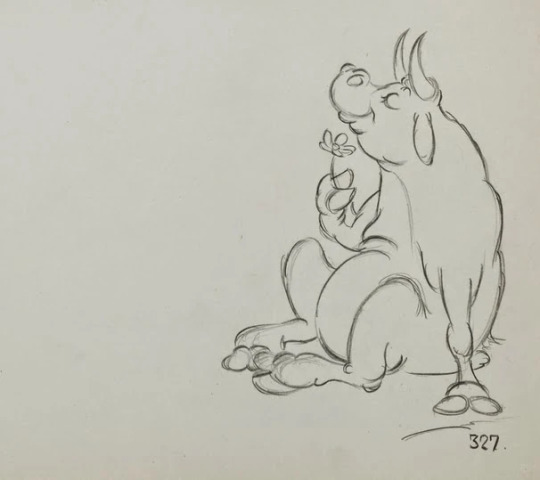
An Icon over the years
After the release of both the book and the film both of them ended up banned from Europe, this is because many of the political leaders at the time saw the film as pacifist propaganda so places like Germany, Italy, and ironically even Spain banned the screening of the short, in the words of Francisco Franco Bahamonde “Ferdinand es una maniobra judeomasónica a favor del pacifismo y de la República” (Ferdinand is a Judeo-Masonic scheme in favor of the republic and pacifism). Another group that Ferdinand impacted was the queer community and movement. Remember how I mentioned the story had the message of "Be yourself", well Disney's short took it one step forward and depicted Ferdinand with stereotypes or actions that would allow queer people to recognize as an allegory to them (this is also called queercoding) which is incredibly clear if you're part of the community like me just how easily the short can be taken as an allegory to both the community and how pathetic toxic masculinity can be.
For the people like me who were born in 2000's Ferdinand is also known as critique on animal cruelty and animal rights. While this is true, the mayor influence for this is neither the book or the original film but instead the 2017 movie produced by BlueSky studios, which re told the story of Ferdinand while also expanding on the previously discussed topics that the character was already known for.

Interestedly enough, in Sweden the original short film is also a staple tradition to watch it due to a show called "From All of Us to All of You" that is screened every Christmas eve where it contains a compilation of Disney shorts including Ferdinand, the short is actually so popular that the one year where they didn't screen it, the show reached it's lowest amount of views, with people complaining to bring Ferdinand back.
Happily Ever After
youtube
If you have the time I heavily recommend you to watch the original film. Personally this is a film that I saw as a child on a DVD and every time I re watch it the story of Ferdinand feels closer to home. So now next time you see this bull around, remember the incredible history he has both in his and our world. Until next time
2 notes
·
View notes
Text
petition: Colombia Finally Banned Bullfighting. Venezuela Must Do The Same!
#animal rights activist#animal advocacy#bullfighting#activist#activism#cultureisnotanexcuseforcruelty#take action#petition
3 notes
·
View notes
Text
Chapter 202 Trivia (Part 2)
(Previous part)
The cows that the KoS find vary in color & horn shape quite a lot, indicating that they could have found several different breeds.
My guess for the one Ryusui fights is one of the auroch-like breeds, e.g. tudanca or limia, possibly crossbred with the pyrenean variety.
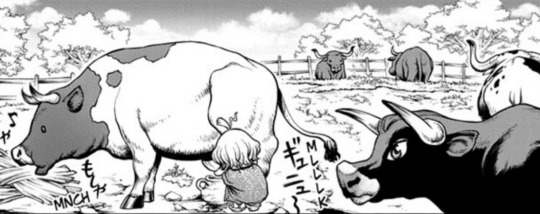
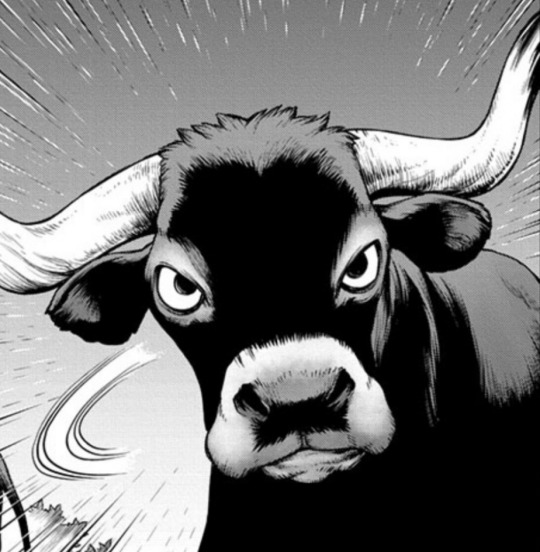
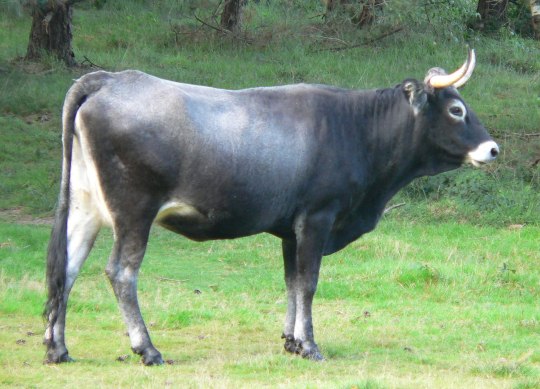
Bullfighting is considered by some as part of the national culture of Spain, however due to the death of the bull and risk of death for the matador, it's highly controversial and banned in Catalonia.
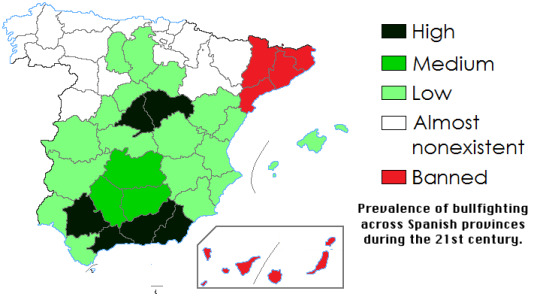
The tradition of waving a bright red flag in front of the bull is just that: tradition. Bulls are colorblind, and are only charging towards the annoying moving object.
Ryusui also runs the bull into an olive tree, knocking several olives off of it.
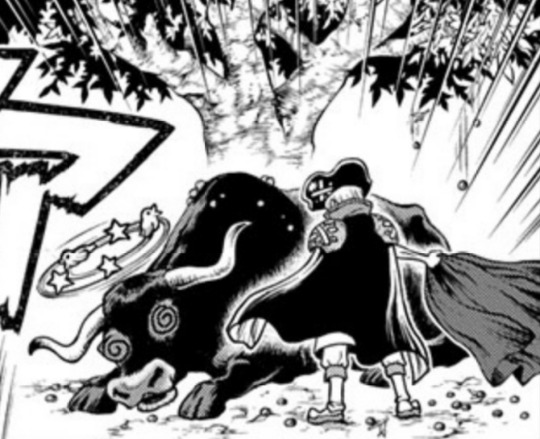
This isn't the first time Ryusui's pro-gamer training has come in handy!



Churro doughs these days can include many ingredients, but traditional ones only needed milk/water, flour, salt, and oil. The dough is extruded through a star-shaped nozzle to get the traditional shape and fried in oil.
If you'd like to know more, see here.

The coins are made of iron-based alloys, with Ni & Cr being used in circulating coins, and Mo & Nb being used in non-circulating and commemorative coins. The rarity of the alloy components increases with the drago value.
(500$ should have featured Chrome rather than Kaseki…)
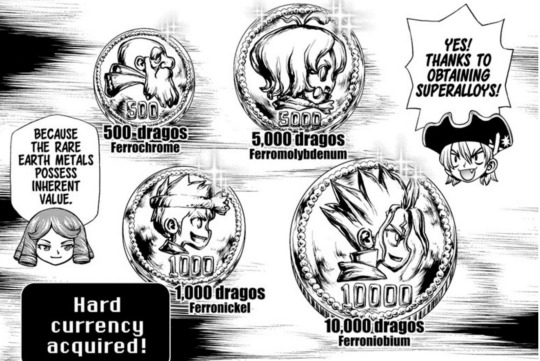
Flamenco dancing is another one of Spain's national symbols. It's a rhythm-heavy style that depends on the dancers to play an "instrument" by tapping their feet to the rhythm.
It's also very popular in Japan: Japan has more flamenco academies than Spain!
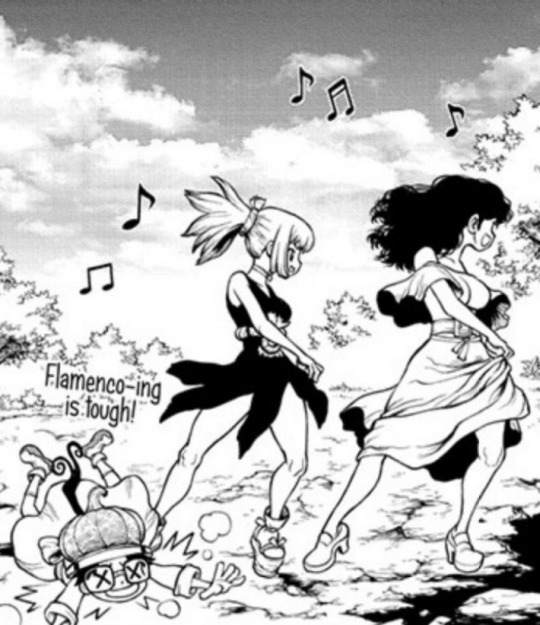
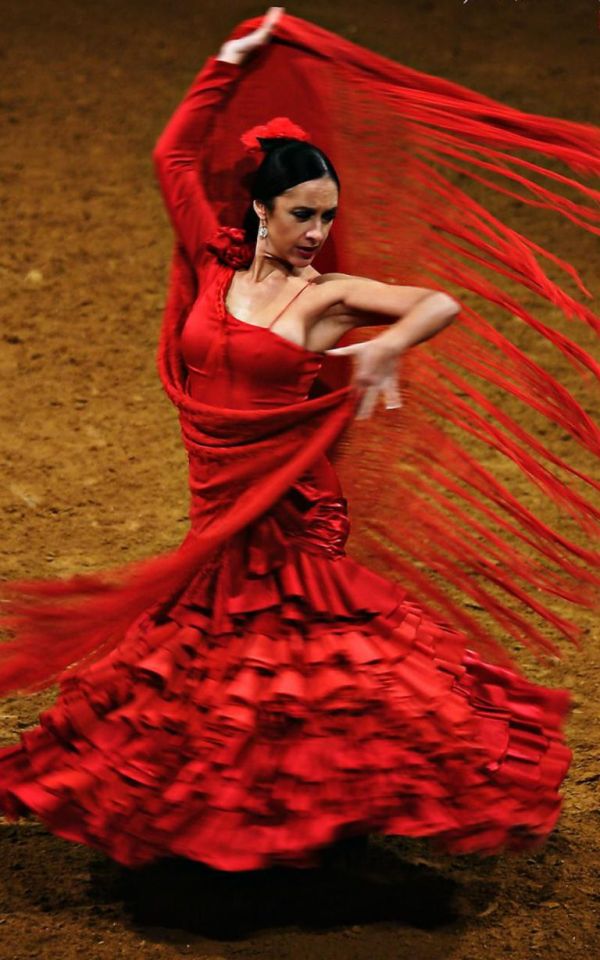
I'm guessing that next chapter will continue in Spain with the acquisition of fluorite (and maybe they'll acquire tomatoes too? Though that might be left for if they visit Italy…)
13 notes
·
View notes
Text

В 1974 году испанская новильера Анжела Эрнандес (начинающая торера, выступающая против молодых быков), выиграла в Верховном суде Испании дело за отмену запрета на участие женщин в корриде. Она заявила: «Женщины водят самолеты, участвуют в военных операциях, охотятся во время сафари. Что такого особенного в битве с быком?». Тогда испанское правительство разрешило девушкам и женщинам выбирать себе любую профессию. И по сегодняшний день женщины-торерас имеют те же права на арене, что и мужчины.
In 1974, Spanish novillera Angela Hernandez (an aspiring bullfighter who competes against young bulls) won a case in the Spanish Supreme Court to overturn the ban on women participating in bullfighting. She said: “Women fly airplanes, take part in military operations, hunt on safaris. What's so special about fighting a bull? Then the Spanish government allowed girls and women to choose any profession. To this day, female bullfighters have the same rights in the arena as men.
5 notes
·
View notes
Text
Colombia’s congress voted Tuesday to ban bullfights in the South American nation, delivering a serious blow to a centuries-old tradition that has inspired famous songs and novels but has become increasingly controversial in the countries where it is still practiced. The bill calls for the banning of bullfights in a three-year span, making the tradition illegal by the start of 2028. The new law now needs to be signed by President Gustavo Petro, who has been a longtime opponent of these events. Bullfighting originated in the Iberian Peninsula and is still legal in a handful of countries, including Spain, France, Portugal, Peru, Ecuador and Mexico. It was once a popular event, broadcast live by multiple television networks. But the tradition has come under increased scrutiny as views change about animal welfare, and many find it unacceptable to see an animal suffer for entertainment’s sake.
4 notes
·
View notes